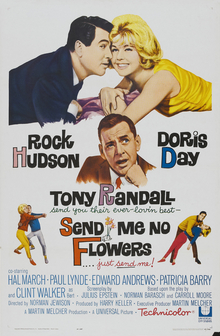Plot
George Kimball, a hypochondriac, lives with his wife Judy in the suburbs. Judy learns from the milkman that their neighbors, the Bullards, are getting a divorce, and shares the news with George.
Over lunch, George is appalled as a bachelor acquaintance, Winston Burr, gleefully describes how he contacts women who are getting divorced and pretends to console them, hoping to seduce them while they are vulnerable.
George visits his doctor and longtime friend, Ralph Morrissey, after experiencing chest pains. He overhears the doctor discussing on the phone a patient who only has a few weeks to live. George assumes that Morrissey is talking about him and is distraught. On the train home, he tells his friend, Arnold Nash, that he will die soon. He has decided not to tell Judy, knowing it will upset her. Arnold solemnly assures George that he will deliver the eulogy at his funeral.
That night, George dreams about Judy marrying Vito, an irresponsible young deliveryman more interested in her inheritance than in her. He visits a funeral home operated by Mr. Akins to buy a burial plot for three people, including a prospective new husband for Judy, giving him a $1000 check made out to "Cash", so that Judy will not discover what the check is for. He decides to find Judy a new husband and asks Arnold to help him.
On a golf outing, Judy's golf cart malfunctions and she is saved by her old college beau Bert Power, now a Texas oil baron. George, jealous over Bert's attentions to Judy, reluctantly agrees with Arnold that Bert would be a great husband for her. During an evening out, George forces Judy to dance and talk with Bert. When George runs into the newly divorced Linda Bullard, who is there with Winston, he takes her to the coat room and warns her about Winston's intentions. She thanks him and kisses him in gratitude. When Judy sees them, she storms out, thinking that he is pushing her to spend time with Bert so that he will feel less guilty about having an affair with Linda. George then tells Judy that he is dying. She is naturally skeptical because of George's history of hypochondria, so he tells her that she can call Dr. Morrissey for confirmation, which convinces her that he is telling the truth.
Judy insists that George use a wheelchair to conserve his energy. However, when she sees Dr. Morrissey and he tells her that George is fine, she thinks George is lying to wriggle out of the consequences of his affair. She rolls him out of the house in his wheelchair and locks him out, announcing her intention to divorce him. George spends the night at Arnold's house, during which time his various demands and idiosyncrasies cause Arnold to strike, one by one, many of the complimentary remarks about George he had planned on making in his eulogy. The next day, George desperately asks Arnold for advice on how to stop Judy from leaving him. Arnold insists that George, although he is innocent, must pretend to confess to Judy that he has had an affair, assure her it is over, and beg for forgiveness.
Judy leaves to buy a train ticket to Reno. George follows her to the train station, where, following Arnold's advice, he concocts a story about an affair he had with a Dolores Yellowstone (Judy has learned from Linda why she was kissing him) and shows Judy the stub from the $1000 check, made out to "Cash", that he had given "Dolores" so she could leave him and start a new life in New York. The scheme backfires as Judy refuses to forgive him, despite his attempt to renege on his "confession". When she goes home to retrieve her bags, Mr. Akins happens to drop by to deliver the burial contracts for George's and Judy's plots and shows her George's check. He also tells her that George had bought a third plot for her prospective second husband. He is mortified to learn that Judy still did not know about George's surprise. Judy now realizes that George had made up the Dolores Yellowstone story. When George arrives at the house, she lovingly "forgives" him. Winston arrives at the house hoping to make Judy his latest conquest, but George knocks him cold and presents Judy with the flowers Winston was carrying.
